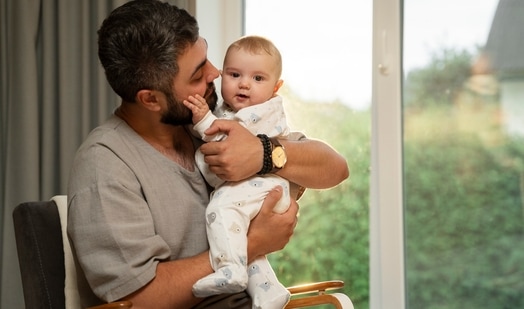ByZarafshan Shiraz, New Delhi
Jul 26, 2024 01:37 PM IST
Guide for new fathers from pregnancy to postpartum: Here’s how to prepare for parenthood and tips to support your partner and baby after birth
The news of entering fatherhood is very exciting as well as intimidating because to imagine bringing a new life into the world can often be overwhelming. The father is, in many ways, the first man to associate with the baby. While a mother is perhaps the most crucial aspect of the baby’s life, being a father is no less important.

Active Participation During Pregnancy
In an interview with HT Lifestyle, Dr Lakshmy Menon, Consultant Neonatologist and Pediatrician at Cloudnine Group of Hospitals in Bengaluru’s Bellandur, shared, “The postpartum period for a dad, typically refers to the first six weeks after childbirth but recovery can take longer. While a mom’s body is healing from childbirth, which may include dealing with stitches, soreness and fatigue or hormonal fluctuations can cause mood swings, anxiety and postpartum depression. At this stage, dads must realise and recognise that recovery is both physical and emotional – right from learning how to change diapers, bathe and soothe the baby to taking on more responsibilities at home to lighten her load.”
Education and Preparation Tips For New Dads
Dr Lakshmy Menon suggested some tips for new dads for postpartum preparation –
- The first and foremost thing to ensure is that you are an important part of the entire pregnancy process. Accompanying your partner for the scans, being interested in the various stages of pregnancy and the baby’s development, being invested in your partners health and indulging their various whims and desires are great ways to develop a strong bond and getting ready for parenthood.
- There are various changes to your partner’s body which create a lot of self-doubts and low self-esteem. It is extremely reassuring for your partner to be encouraged with regards to the changes, establishing date nights, impromptu dinners and ‘baby moons’ really help with their self-confidence!
- Attending workshops and lamaze classes helps you to understand the birthing process and how you can be involved in the journey till your baby is born. What are the routines that may be expected once the baby arrives , changing of diapers and bath times etc. are some of the classes that may help you in getting ready .
- The finances of the family need to be sorted. Budgeting for the pregnancy to the baby needs to be planned in detail. Clearing up your work schedule so that all important deadlines are met before the baby is born helps in being a “present and available’ partner. Sort out your health so that you are healthy and fit.
- Get into a proper routine with diet and exercise. This helps in having enough energy to deal with your baby’s needs as well as understanding your partner’s. Once the baby is born, give yourself enough time to be with the baby.
- Culturally, there are sometimes families around the new mum, sometimes it’s just you as a couple. Whatever the case, the infant needs to bond with you. So being available, exercising your paternity leave , goes a long way to establishing the parenting bond. The families form a part of important support structure for the new parents. Babies are unpredictable, just like new mums, even fathers experience a sense of depression if the baby does not seem to be soothed by them or bonding to them!
- Cut yourself some slack and don’t expect to get it alright in the first go. The books only prepare you so much …the real deal is always after. The transition to fatherhood is profound and kind of a big life changing event. The more one gathers information, the smoother the transition it is!
Always remember that the postpartum period is a critical time for both mom and baby, requiring patience, support and understanding. Education, preparation and open communication are essential for navigating this period smoothly. Self-care and recognising the signs of postpartum depression are crucial for both parents. By being proactive and supportive, dads can play a vital role in ensuring a healthy and happy postpartum experience for the whole family.


